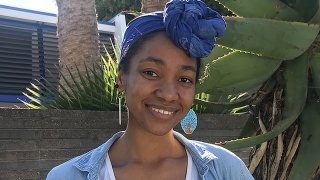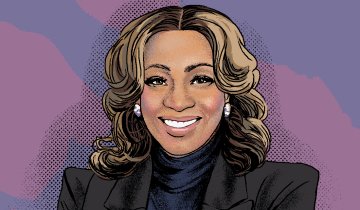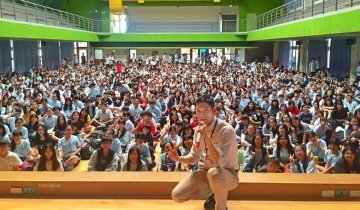The power of story has long been not only an interest, but a passion for Christiana Cobb-Dozier, a recent graduate of USC Rossier’s Master of Education in School Counseling online program. It was this fascination with story, combined with a love for writing, that initially sparked Cobb-Dozier’s interest in the field of journalism during her undergraduate studies at San Jose State University.
Journalism felt like a natural choice for Cobb-Dozier, and she gained many useful skills, from learning how to ask questions to expertise in working with new storytelling technologies. But, like many high school students in California, Cobb-Dozier, who grew up in Sacramento, didn’t have access to a counselor in either high school or college. She thought journalism or teaching English were the only options for someone like her. “I didn’t have counselors who help[ed] me explore.” In hindsight, she now realizes that there are many career paths for someone with her skillset, but, she said, “if I had a counselor, I probably would have had more guidance in that area.”
While at San Jose State, Cobb-Dozier was also involved with Black Campus Ministries (BCM), an organization that describes itself as being committed to “reaching black students and faculty at majority institutions and historically black colleges and universities nationwide, ministering to the unique needs of the community.” After graduation, she continued working at BCM, and soon found herself acting as an impromptu “advisor to the students in the organization … and counseling them through their college experiences.” From these encounters, Cobb-Dozier said, she “discovered this piece of myself that I didn’t acknowledge when I was going through undergrad.”
After three years of working with BCM, Cobb-Dozier found herself at a crossroads. “I’ve always loved kids, but never thought there were careers in education outside of being a teacher. That's kind of where I limited myself … But then I started exploring other careers, and I looked into school counseling.”
With school counseling, Cobb-Dozier felt she had found her calling. Her ad-hoc counseling sessions at BCM had left her wondering what the students’ experiences in college could have been like if they had been given the opportunity to develop things like conflict resolution skills in middle or high school. “How much easier would it have been to deal with this stuff by the time they got to college?,” she wondered.
Charting a new path
So, what makes a good school counselor? “Someone who is a good listener. Who cares about people's stories and their truth; somebody who's empathetic, compassionate, non-judgmental and a good communicator,” Cobb-Dozier explained. Also essential, she believes, is a sense of humor, especially because you’re working with kids.
As Cobb-Dozier began researching graduate programs that would give her the necessary tools to become a school counselor, USC Rossier’s program stood out because of its “focus on social justice,” something that has always been important to her. She was uncertain of her chances of getting in. She humbly describes herself as “just the average kiddo.” “I went to a junior college first and transferred to San Jose State,” Cobb-Dozier said. But she didn’t let that stop her. She applied and was elated when she was accepted into the program.
The hands-on experience Cobb-Dozier gained through USC Rossier’s program has been invaluable for her as it’s helped her explore school counseling career paths at all age levels. It came as “a little bit of a shock,” she said, to discover how much she loved working with elementary- and middle school-aged children.
The strategies for working with these age groups are different than the tools she used while working with the college-aged students at BCM. At the elementary level, there is a lot of “gameplay and a lot of drawing and art therapy,” Cobb-Dozier explained. And while “you can have big conversations with tinier humans too, [middle schoolers] are at an age where they're able to really start to digest that information [and] start having those deeper conversations,” she said.
Embracing change
As for what’s next, Cobb-Dozier would love to start working in an elementary or middle school, and she is also looking at opportunities in high school as well. USC Rossier’s School Counseling program is entirely online, something that Cobb-Dozier believes has prepared her well for a world turned upside down by the COVID-19 pandemic, a moment in which online classes and distance learning is the new normal. “There is something that I can bring to the table, and I look forward to jumping in at this particular time,” she said.
The lasting effects of the COVID-19 pandemic are still very much an unknown quantity, but it seems certain that the global crisis will reshape the world as we know it. There will be a “before” and an “after.” And Cobb-Dozier, like many of us, has been doing a lot of reflecting and contemplation during this time. “We don’t necessarily learn the same way we did 50 years ago,” she explained. “Our times are changing and [the pandemic] has shown us the ways that we need to be flexible and mindful.”
The Class of 2020 will undoubtably face unprecedented challenges. Cobb-Dozier, who was selected as a flag bearer by her peers, celebrated the milestone virtually. More than ever, Cobb-Dozier believes, the crisis demands that we acknowledge how essential it is to care for the whole child and incorporate social-emotional learning into the education system. “We're all going through trauma now,” she says, “so if you didn’t think you had any trauma in your life, now you definitely do. We're all experiencing this together.”
Cobb-Dozier leans on her training in journalism as she thinks about how she can be the best school counselor in a world reshaped by a virus that has dramatically altered how we will educate youth. At first, it was difficult for her to see the parallels between the two vocations, but now she sees that it was “the power of someone’s story. That's what led me into journalism and that's what leads me into counseling. [Experiencing] the power of someone's story and getting to be present with them, that is just the best. It’s the best job in the world.”




